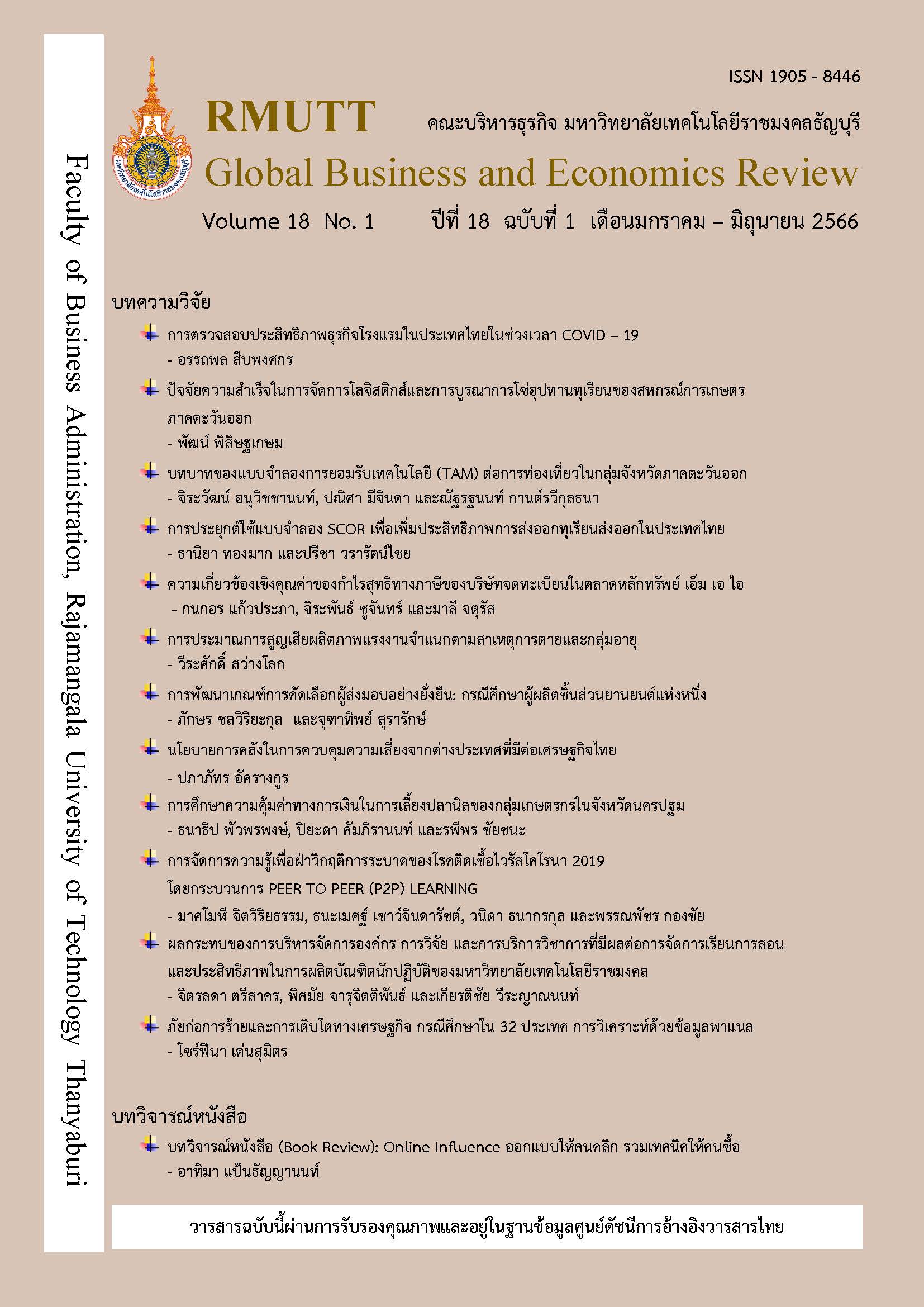VALUE RELEVANCE OF TAXABLE INCOME OF LISTED FIRMS IN THE MARKET FOR ALTERNATIVE INVESTMENT (MAI)
Keywords:
Value Relevance, Taxable Income, Book Income, Corporate Income Tax PlanningAbstract
The objectives of this research are to test the value relevance of taxable income applied from the valuation model of Ohlson (1995) and to study the impact of corporate income tax planning on the value relevance of taxable income of firms listed in the Market for Alternative Investment (MAI), excluding financial segments. Data was collected during 2020-2021 (totally 339 firm-year observations). It was analyzed with percentage, mean, standard deviation, multiple correlation, and multiple regression analysis. The results showed that no statistically significant relationship between taxable income and stock price. It implied that taxable income is not a factor in determining the stock price. However, if taxable income is used jointly with book income and book value of equity, it will have value relevance significantly and can explain stock price better. Additionally, the findings showed that corporate income tax planning is a moderating variable that impairs the value relevance of taxable income to investor decision-making.
References
กรมสรรพากร. (2565). ภาษีเงินได้นิติบุคคล. สืบค้นจาก https://www.rd.go.th/9292.html
ตลาดหลักทรัพย์แห่งประเทศไทย. (2565). ข้อมูลรายบริษัท/หลักทรัพย์. สืบค้นจาก https:// classic.set.or.th/set/companyhighlight.do
สภาวิชาชีพบัญชี. (2563). กรอบแนวคิดสำหรับการรายงานทางการเงิน. สืบค้นจาก https:// www.fap.or.th
สุเทพ พงษ์พิทักษ์. (2563). เทคนิคการจัดทำแผนที่ภาษีอากรเพื่อลดข้อผิดพลาดทางภาษี. กรุงเทพฯ: ธรรมนิติเพรส.
Ayers, B., Jiang, X., & Laplante, S. (2009). Taxable income as a performance measure: The effects of tax planning and earnings quality. Contemporary Accounting Research, 26, 15-54.
Barth, M. E. (2000). Valuation-based accounting research: Implications for financial reporting and opportunities for future research. Accounting and Finance, 40, 7-31.
Desai, M. (2006). Testimony of Mihir Desai associate professor Harvard University before the subcommittee on select revenue measures. Committee on Ways and Means. House of Representative. May 9.
Fama, E. (1970). Efficient capital markets: A Review of theory and empirical work. The Journal of Finance, 25(2), 282-417.
Graham, R., King, R., & Bailes, J. (2000). The value relevance of accounting information during a financial crisis: Thailand and the 1997 decline in the value of the baht. Journal of International Financial Management & Accounting, 11(2), 84-107.
Hair, J. F., Black, W. C., Babin, B. J., & Anderson, R. E. (2010). Multivariate data analysis: A global perspective. New Jersey: Pearson Prentice Hall.
Hanlon, M. (2005). The persistence and pricing of earnings, accruals and cash flows when firms have large book-tax differences. The Accounting Review, 80(1), 137-166.
Hanlon, M., Laplante, S. K., & Shevlin, T. (2005). Evidence for the possible information loss of conforming book income and taxable income. Journal of Law and Economics, 48(2), 407-442.
Holthausen, R. W. & Watts, R .L. (2001). The Relevance of the value-relevance literature for financial accounting standard setting. Journal of Accounting and Economics, 31(3), 3-75.
Kim, J. (2020). Does taxable income under full disclosure of earnings provide incrementally useful information to investors?. Journal of Asian Finance, Economices and Businesss, 7(9), 271-281.
Lev, B. & Nissim, D. (2004). Taxable income, future earnings and equity values. The Accounting Review, 79(4), 1039-1074.
Martinez, A. L. & Ronconi, L. B. (2013). The informativeness of taxable income and book income before and after the adoption of IFRS in Brazil. Business Management Dynamics, 3(5), 51-63.
Mayberry, M. A., Mcguire, S. T., & Omer, T. C. (2015). Smoothness and the value relevance of taxable income. Journal of the American Taxation Association, 37(2), 141-167.
Noor, M. R. & Matsuki, N. (2009). Book-tax difference and value relevance of taxable income: Malaysian evidence. Journal of Financial Reporting & Accounting, 7(2), 19-40.
Oh, K. W. & Ki, E. S. (2020). Effect of tax-related information on pre-taxable income forecast and value relevance. Journal of Asian Finance, Economices and Businesss, 7(1), 81-90.
Ohlson, J. A. (1995). Earnings, book values, and dividends in equity valuation. Contemporary Accounting Research, 11(2), 661-687.
Tang, T., & Firth, M. (2006). Market perceptions of the information in book-tax differences: An empirical study in China’s capital markets. Retrieved from https://papers.ssrn.com/sol3/papers.cfm?abstract _id=927167
Vichitsarawong, T. (2011). The value relevance of earnings and cash flows: evidence from Thailand. Journal of Accounting Profession, 7(19), 39-53.
Downloads
Published
How to Cite
Issue
Section
License
Copyright (c) 2023 กนกอร แก้วประภา, จิระพันธ์ ชูจันทร์, มาลี จตุรัส

This work is licensed under a Creative Commons Attribution-NonCommercial-NoDerivatives 4.0 International License.
The articles published in this journal are the intellectual property of their respective authors.
The views and opinions expressed in each article are solely those of the individual authors and do not reflect the positions of Rajamangala University of Technology Thanyaburi or any of its faculty members. All components and content of each article are the sole responsibility of the respective authors. In the event of any errors, the authors shall bear full responsibility for their own work.








